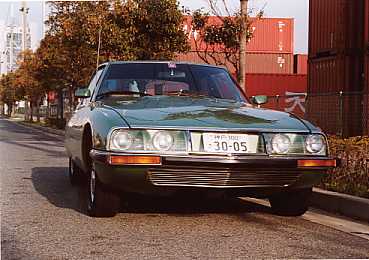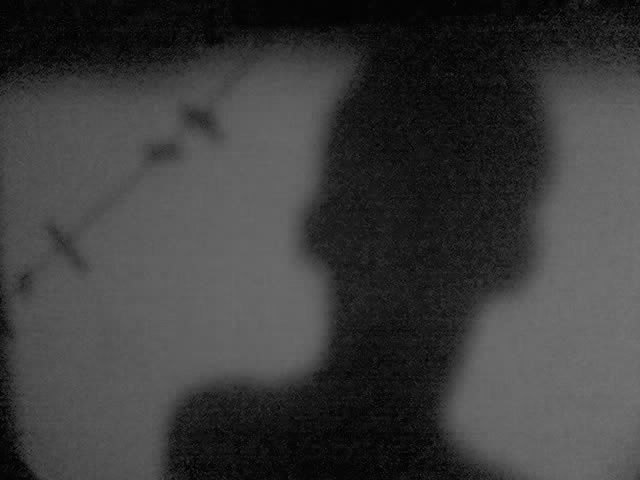Friday, September 24, 2004
Sight
 My sister has a son now and I have watched him with a sense of wonder. My nephew looks so much like her. His eyes especially are the same lucid brown as hers, and those match again the color of my father's eyes. Me, I have grey eyes like my mother, but I'd like to think I see a bit of myself in my nephew's face and in his white blond hair, like I had at his age.
My sister has a son now and I have watched him with a sense of wonder. My nephew looks so much like her. His eyes especially are the same lucid brown as hers, and those match again the color of my father's eyes. Me, I have grey eyes like my mother, but I'd like to think I see a bit of myself in my nephew's face and in his white blond hair, like I had at his age.
My nephew is still so young that the changes each time I see him have been profound. He has begun to talk. You could have knocked me over with a feather when he greeted me a few weeks ago with a well-spoken "How are you, Uncle Hug Shy?"
No babyish jibberbabble then or the rest of the time. As we adults talked, I could hear him following along to himself, imitating the exact inflections of voice and repeating our sentences word-for-word, including what grandma called the "silver dollar" words. A smart kid.
My sister's approach to child-rearing has caused some family consternation. She was adamant on breast feeding and her right to do it in public. This took some getting used to, particularly for my parents. But they got used to it quickly. As a newborn, the nursing took on an acceptable Old Master visual to it: A sentimental "Mother and child" tableau.
But this familiarity has become uncomfortable as my nephew has gotten older. Now well over two years old, even I was jolted when he began jumping up and down at a button-down restaurant demanding "Mommy-milk!" I hoped I hadn't heard right, but fast looks exchanged with my parents told me I had, and this spectacle was an all-you-can-eat helping of equal parts hilarity and disturbed embarrassment.
I'll have another Gin Gimlet, please.
In recent years I've revisited the events of my past. I've thought deeply over the "nature versus nurture" conundrum. How much is my outlook based on personal experience; how much of my viewpoint is inherited?
My longest relationship was with a minister. It lasted nearly six years and when it ended it ended badly. While I might carry a civil conversation if I bumped into him today, I look back now and realize we must never have known each other and that has been a sad realization.
My ex was possessed of a kind of magnetism I had never encountered before -- and not since. A hundred lights would switch on when he entered a room. People wanted to meet him.
His sermons were something to see: The pulpit was left behind, with his voice climbing and body crescendoing like a pendulum swings across the stage -- and then down into the aisles. With each few sentences, he reached a different individual with his arms or with his eyes and thus it seemed he personally reached everyone. All eyes remained fixated in a happy glaze. The money was good.
I suppose he would think his sermons were completely lost on me, but I remember more than he would give me credit for.
"In these times of disease of death, in these times of destruction, you may feel lost. You may feel blind. You may have felt you have lost sight of God. Perhaps you think God has lost sight of you. And yet -- and yet, my brothers and sisters, He has not. He is everywhere. Turn to the person sitting next to you. Who do you see? Is that not divine proof of His creation? You can tell yourself you cannot see Him, but you see his works. You have touched God! And every minute of every day, God sees you and yes, you see God!"My ex had been a child sensation, preaching all over the United States, the Carribean, and South America before he was fifteen. I asked him what it was like to be a boy preacher. He said it was like being in a daze. He didn't like to talk about it.
If it is 1973, perhaps my future ex is spreading the word in a stadium in the Dominican Republic or in a bar in the Bronx, but miles away I sit miles away from my mother in the vinyl front seat of a blue 1970 Chevrolet Impala two-door sedan. I watch her instinctively look for the clutch with her foot (even though it is an automatic), and check the mirrors before shifting carefully into 'reverse.'
"Ugh, these big cars." She says, "They're supposed to be easier to drive but, honestly, if I don't keep my foot on the brake I'm afraid I'll lose control of it."
"Mom, did you know we were in a war?"
Mom doesn't look at me, she is concentrating on her driving as she shifts to 'Drive' and we start moving down tree-lined streets of the old village. "It's not a war because Congress never declared it a war. We are -- were -- engaged in a conflict with Viet Nam."
"Well I knew we had stuff going on there, but just not a War. It's like not knowing about World War II or something." Coming at us in the other direction I spot a 1969 Mercury Marquis (beautiful), a 1971 Ford Thunderbird (ugly) and a 1969 Pontiac Bonneville (ho hum).
My mom sighs, "It is not like World War II. It's not something we wanted to expose you children to."
"Why not?" We pass a parked 1968-70 model year VW (Herbie!).
"Because a lot of people are losing their lives."
"Didn't a lot of people die in World War II?"
We pull up to a stoplight. I am busy identifying more cars but my mom continues after a moment, still not looking at me. "It seems to be ending now, but Viet Nam was going on for a long time. Your father and I discussed moving to Canada because you were getting older and it looked like it might continue at the time you would become an adult."
"Really?" Canada has a lot of the same cars the United States has. Maybe they have a lot more Opals and Volvos.
My mom has her face fixed in an expression because she is trying to say something. I hear the metrinome clicking of the turn signal. "There seems to be so much suffering in the world."
I can see her mouth working to find the right words. "I don't know what I think about God," she struggles. "I don't know if he exists." As we turn the corner at South Franklin, I can see her glance at me, to see how I'm reacting. "There's all this suffering in the world, I don't see how a God would allow that."
There! Up ahead. Coming down Washington Street is a brand-new 1972 Citroen SM coupe. Look, Mom, can't you see? The car is a lustrous gold, with sleek bubble-wrapped headlights and a rear window covered with by a glittering grill. It seizes the afternoon sunlight as it turns into the Sohio Gas Station at the corner of Main. It is a thing of beauty and I am awed by it.







